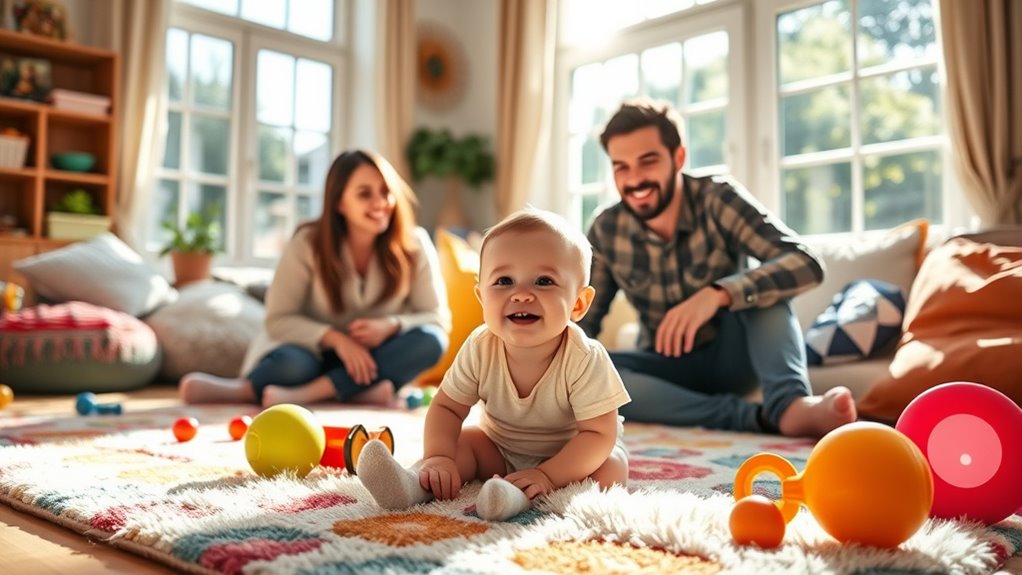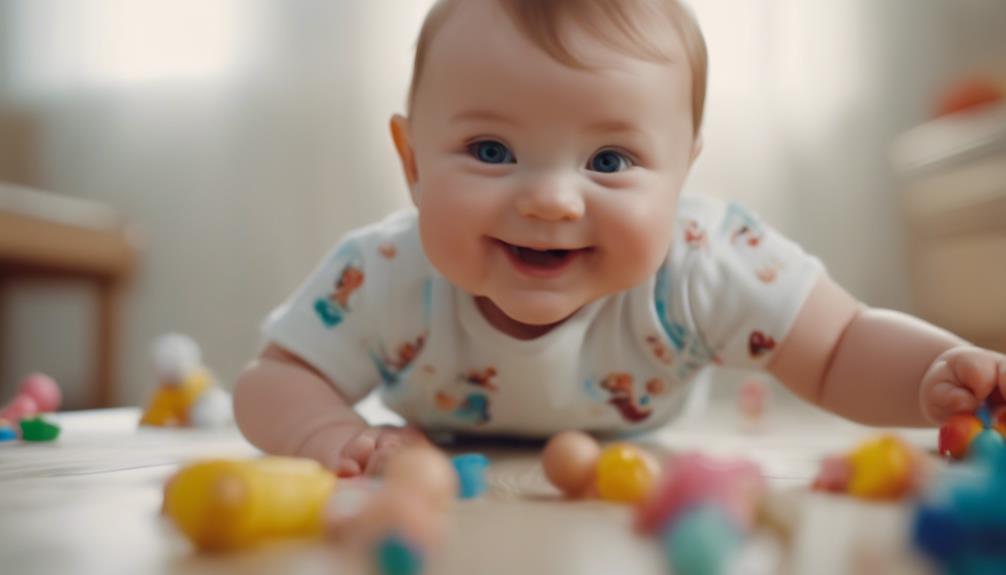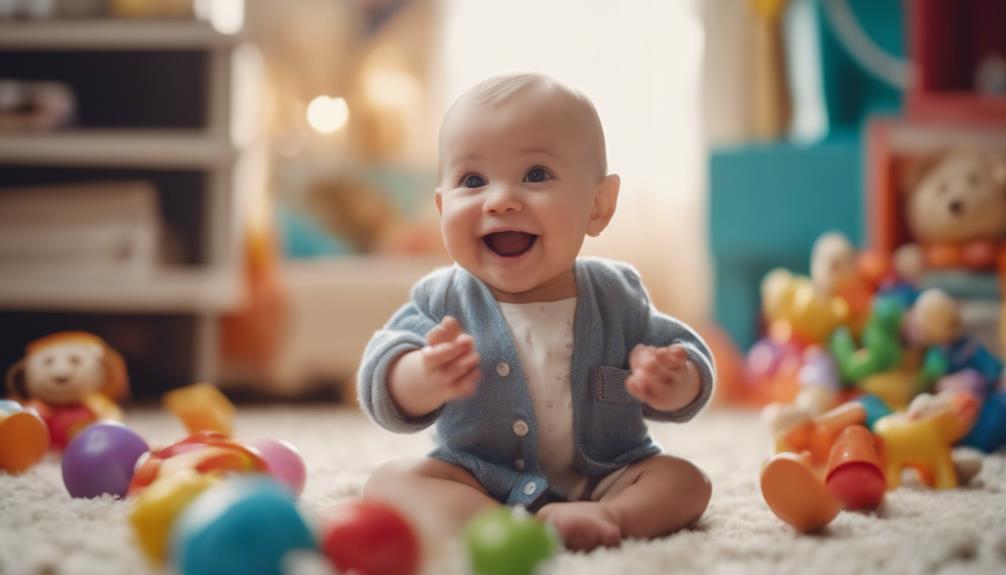To raise a happy, emotionally healthy baby, focus on building strong bonds through consistent presence, gentle touch, and open communication. Respond promptly to their needs, create a stable environment, and validate their feelings to foster secure attachment. Encourage emotional expression and model calmness to develop resilience. These habits help your child grow confident and joyful. If you keep practicing these principles, you’ll discover more ways to support your baby’s emotional well-being for a vibrant future.
Key Takeaways
- Establish consistent, loving routines that foster a sense of security and trust for your baby.
- Engage in gentle touch, eye contact, and responsive caregiving to build strong emotional bonds.
- Encourage open communication about feelings as your child grows to promote emotional understanding.
- Model calmness and healthy emotional expression to help your baby develop resilience.
- Prioritize ongoing bonding activities to support your child’s emotional health and overall happiness.

Have you ever wondered what it takes to raise a truly happy baby? It all starts with establishing strong parental bonding. When you spend quality time with your little one, you’re not just feeding or changing them—you’re creating a foundation of trust and security. Responding promptly to their needs, offering gentle touch, and engaging in eye contact helps your baby feel loved and understood. These simple actions foster emotional resilience, which is essential for their development. As your baby learns that they can rely on you, they start to develop confidence in themselves and the world around them. Parental bonding isn’t just about immediate comfort; it shapes how your child handles stress and setbacks later in life. When they grow, they’ll carry these early emotional connections with them, enabling them to bounce back from challenges more easily.
You might think that raising a happy baby means constantly soothing every cry or giving them everything they want, but it’s more about creating a stable emotional environment. When you’re consistently present and attentive, you help your child build a sense of safety that allows them to explore and learn. This secure attachment becomes the cornerstone of emotional resilience. Over time, your child will develop the ability to manage their feelings because they’ve experienced firsthand that they are cared for and supported. This doesn’t mean shielding them from all difficulties—rather, it’s about teaching them how to navigate emotions healthily. When you model calmness during stressful moments and validate their feelings, you teach them to do the same. These habits cultivate emotional strength, which is fundamental for happiness and overall well-being.
Building these habits requires intentionality. Make eye contact during feedings, hold your baby close, and speak softly to reinforce your presence. As they grow, encourage open conversations about feelings and listen without judgment. This helps them understand that their emotions are valid and manageable. Remember, emotional resilience isn’t something you can force; it develops over time through consistent, loving interactions. Recognizing the importance of parental bonding and its impact on emotional resilience is key to raising a healthy, happy child. By prioritizing parental bonding now, you’re equipping your child with the tools they need to face life’s ups and downs with confidence. Ultimately, raising a happy baby isn’t about perfection but about creating a nurturing environment where love, trust, and resilience flourish. Your ongoing efforts will pay off as your child becomes emotionally healthy, resilient, and joyful—ready to take on whatever the future holds.
Frequently Asked Questions
How Can I Tell if My Baby Is Emotionally Healthy?
You can tell if your baby is emotionally healthy by observing their attachment security and emotional resilience. If your baby easily seeks comfort when upset and quickly recovers from minor stresses, they’re showing strong emotional resilience. Additionally, secure attachment means they trust you and feel safe exploring their environment. These signs indicate your baby is developing a solid emotional foundation, which is essential for healthy growth and future relationships.
What Early Signs Indicate Emotional Struggles in Infants?
Like a lighthouse warning of storms ahead, early signs of emotional struggles in your infant include unusual fussiness patterns and difficulty with attachment cues. If your baby seems overly clingy or unusually withdrawn, it may signal underlying issues. Pay attention to their response to comfort and change. Recognizing these subtle signals early helps you nurture emotional health, guiding your little one safely through their developmental journey.
How Do Parental Stress Levels Affect a Baby’S Happiness?
Your stress levels directly affect your baby’s happiness because parental well-being influences their emotional environment. When you manage your stress effectively, you create a calmer, more secure space for your little one, fostering trust and happiness. Conversely, high stress can lead to less patience and inconsistent responses, which may upset your baby. Prioritizing stress management helps you maintain emotional health, ultimately supporting your child’s well-being and happiness.
Are There Specific Activities That Promote Emotional Development?
You can promote emotional development through simple activities like playtime bonding and sensory exploration. By engaging in regular play, you build trust and strengthen your connection. Incorporate sensory activities, like feeling different textures or listening to various sounds, to help your baby understand and express emotions. These activities encourage curiosity and emotional awareness, laying a foundation for healthy development as your baby explores the world and learns to manage their feelings.
When Should I Seek Professional Help for My Baby’s Emotional Health?
Imagine your baby’s emotional health as a vintage record—sometimes it needs extra care. You should seek professional help if you notice attachment security issues, delays in developmental milestones, or persistent fussiness and withdrawal. Trust your instincts; if something feels off, consult a specialist. Early intervention supports healthy emotional growth, ensuring your baby feels safe and loved as they navigate these essential early stages.
Conclusion
So, you’ve learned the secrets to raising a happy baby—yet, isn’t it amusing how sometimes, the simplest habits like patience and consistency can feel the hardest to master? Ironically, the more you focus on nurturing emotional health, the more natural it becomes. Remember, perfect isn’t the goal; a loving, resilient family is. So go ahead, embrace the journey, and enjoy the chaos—because sometimes, the happiest families are the ones who’ve learned to laugh through it all.










